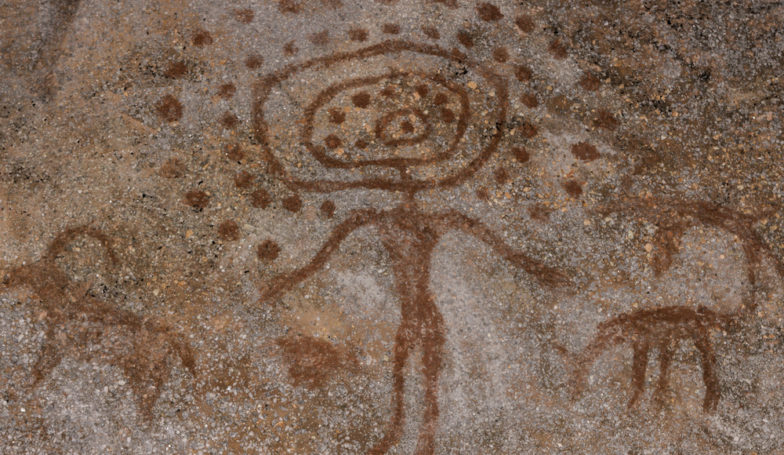What Does a “Very Good World” Look Like? Part 1 of 2
God’s Instructions to “Subdue” and “Rule” Imply the World Was Harsh Before the Fall
One point of contention among those who believe in creation is the issue of death and decay in the original created order. The question, simply stated, is whether or not death, decay, disease, harsh conditions, etc., exists as a part of the world before the fall of Adam.
When God proclaimed creation “very good,” (tob meod) was the world blissful, like the popular concept of Nirvana—or did it function under harsh conditions?1 Was it “perfect,” with self-sustaining agriculture and lions that literally ate straw? Or was it a world full of potential, in need of taming and management? Did fruit trees need pruning and did lions “lie in wait in a thicket” to “hunt the prey”?
Many old-earth creationists (OEC) hold that death and subsequent decay did occur in the original created order, but just not for man in his closed environment called “the Garden of Eden.” Young-earth creationists, on the other hand, often have a more restrictive interpretation. For example, Dr. Jonathan Sarfati writes, “A straightforward interpretation of Genesis shows that death of humans and vertebrate animals (Hebrew nephesh chayyah, “living creature”) is the result of Adam’s fall.”2 Is this as clear as Dr. Sarfati asserts—or does the Bible suggest another interpretation?
The answer to this question may be found in the words kabash and radah (rendered “subdue” and “rule,” respectively, in most English translations) as used in Genesis 1:28. God instructs Adam to,
“Be fruitful and multiply, and fill the earth, and subdue it; and rule over … every living thing” (emphasis added).
Popular interpretation of the pre-fall world as a “blissful Nirvana” has become the de facto position and, for some, a test of orthodoxy. Before the fall man is believed to have lived in a paradise in harmony with nature. Thus, God’s command to “subdue” and “rule” is viewed as a nebulous, benign stewardship. Animatronic figures of children and dinosaurs playing together on display at the Creation Museum in Kentucky illustrate this in the extreme. It seems that, according to this interpretation, man’s only task was not to mess it up by eating forbidden fruit.
However, this unspoiled paradise scenario is not consistent with the meanings of kabash and radah. A Hebrew lexicon defines kabash as “subdue, bring into bondage;”3 and it defines radah as “have dominion, rule, dominate.”4 These words imply an aggressive, forceful stewardship, and suggest that the “blissful Nirvana” interpretation is wrong. Instead, the Bible teaches that the pre-fall world required humanity to tame and manage it. Land needed cultivation, fruit trees required pruning, and lions probably laid in wait to hunt prey.
In order to paint a good picture of conditions in the pre-fall world, it is necessary to review the uses of kabash and radah elsewhere in the Old Testament. Eleven other uses of kabash all refer to violent action against strong resistance. Specifically kabash is used in regards to:
- Military conquest against a strong enemy a. The Israelites conquering Canaan.5 b. King David conquering neighboring peoples.6
- God freeing his people by throwing off the yoke of their captors with the coming of the Messiah. 7
- Enslavement a. Israelites capturing and enslaving residents of Judah. 8 b. Jews selling themselves into slavery. 9 c. Forced enslavement of Jews by their Jewish brothers.10
- Haman charged with intent to assault Queen Esther. 11
- God destroys the sins of those who repent. 12
Old Testament uses of radah beyond Genesis 1 always imply total control and/or conquest—even total destruction—in the face of violent resistance (or the potential for violent resistance). Radah occurs five times in Mosaic literature after Genesis 1, in regards to:
- Management of slaves. Leviticus 25:43, 46, and 53 seem especially revealing. Verses 44-46 give Israelites carte blanche with regard to slaves who are “aliens among you,” but verses 43, 46, and 53 repeat specific instructions not to “rule” (radah) Israelite slaves “with severity” or “ruthlessly.” Use of a qualifier to decrease severity suggests radah might have an element of brutality.
- Rule of the Israelites by cruel enemies if they reject God’s laws and commands.13
- Conquest and destruction of evil opponents by the Messiah and/or David.14
The usage of radah is similar in 14 instances throughout non-Mosaic literature:
- Solomon’s absolute control of the territories and “kings” within his empire.15
- Control of taskmasters over the conscripted workers in Solomon’s building projects (including the temple).16 The work was not carried out joyously, but under great severity; if the dialog in 1 Kings 12 between the people and King Rehoboam after Solomon’s death is literal, the conscripts were controlled and directed with “whips.”
- The severe rule of the Israelites by their enemies.17
- Rule over the wicked by the righteous after death.18
- God’s vanquished enemies (“them”) ruled (or led) in the victory procession by the tribe of Benjamin, the smallest and weakest tribe.19
- The Messiah’s absolute rule, as prophesied by David.20
- Absolute control by Israel of her enemies when God restores His people by defeating their enemies.21
- Rule of the people by priests, allowing or blocking access to God.22
- Radah with a negative—implying no control.23 God through Ezekiel promises a restored Egypt will exert no control over its neighbors.
- Mistreatment and abuse of the weak in Israel by their stronger brothers.24
In the context of the popular “blissful Nirvana” interpretation, it is useful to evaluate the “minimum requirement” of the text. That is, what is the least restrictive usage of kabash and radah?
- The minimum use of kabash seems to be assault.25 Other uses involve enslavement and killing people, both of which increase in the level of brutality involved.
- The minimum Mosaic use of radah seems to be God’s instructions to the Israelites not to “rule with severity” over slaves who are fellow Israelites.26 Mosaic literature says elsewhere that an Israelite slave provides “double the service of a hired man” to a fellow Israelite.27 Hence, the minimum use implies submitting to the will of another, such as an employer or a benevolent master.
- The minimum non-Mosaic use of radah is probably control of taskmasters over the conscripted workers in Solomon’s building projects (including the temple).28 Based on 1 Kings 12, they were at the very least treated like Israelite slaves; however, if whips were really used, they were governed more severely.
Words have meaning. When the various uses of kabash and radah unanimously convey such a strong connotation—with no clear indication of any other meaning in the context of Genesis 1—it is statistically significant. That same strong connotation must be deemed to apply to Genesis 1.
Our next article will discuss application of the meanings of kabash and radah to the question of the condition of the world before the fall.

Dr. Hugh Henry received his Ph.D. in Physics from the University of Virginia in 1971, retired after 26 years at Varian Medical Systems, and currently serves as Lecturer in physics at Northern Kentucky University in Highland Heights, KY.

Mr. Daniel J. Dyke received his Master of Theology from Princeton Theological Seminary 1981 and currently serves as professor of Old Testament at Cincinnati Christian University in Cincinnati, OH.
| Part 1 | Part 2 |
Endnotes
- Note that this is the Hebrew comparative form of the adjective, not the superlative; this implies that the world was in better condition, but not in perfect, or even in the best, condition.
- Jonathan Sarfati, Refuting Compromise: A Biblical and Scientific Refutation of “Progressive Creationism” (Billions of Years) As Popularized by Astronomer Hugh Ross (Green Forest, AR: MasterBooks, 2004), 195. In reading the quote and the title of this work, the reader should note that Dr. Sarfati engages in a type of argument known as “poisoning the well.” The term “compromise” carries the idea of unfaithfulness and rejection of biblical authority.
- Francis Brown et al., ed., A Hebrew and English Lexicon of the Old Testament (London: Oxford University Press, 1972), 461.
- Brown et al., ed., A Hebrew and English Lexicon of the Old Testament, 921-2.
- Numbers 32:22, 29; Joshua 18:1 (subdued, NASB).
- 2 Samuel 8:11; 1 Chronicles 22:18 (subdued, NASB).
- Zechariah 9:15 (devour and trample, NASB).
- 2 Chronicles 28:10 (subjugate, NASB).
- Nehemiah 5:5 (forced into bondage, NASB).
- Jeremiah 34:16 (brought into subjection, NASB).
- Esther 7:8 (assault, NASB).
- Micah 7:18 (tread under foot, NASB).
- Leviticus 26:17 (rule, NASB).
- Numbers 24:19 (have dominion, NASB); this is Balaam’s prophesy.
- 1 Kings 4:24 (had dominion, NASB); Psalm 72:8 (rule, NASB). Since Psalm 72 is Messianic prophesy, this use of “rule” also refers to the Messiah’s rule. However, since the context is comparison with the rule of Solomon, it seems appropriate to group Psalm 72:8 with 1 Kings 4:24.
- 1 Kings 5:15, 9:23; 2 Chronicles 8:10 (ruled, NASB).
- Nehemiah 9:28 (rule, NASB).
- Psalm 49:14 (rule, NASB). The severity is less clear in this instance, but the context of the psalm is that good people triumph over the wicked after death—even if the wicked may triumph in life.
- Psalm 68:27 (ruling, NASB). Although the antecedent of “them” is ambiguous, it is unlikely that the antecedent is “the princes of Judah” since Benjamin ruled Judah only during the reign of Saul and the context of the Psalm is God’s defeat of His enemies and bringing them under the rule of God’s people
- Psalm 110:2 (rule, NASB). Although precise meaning of the phrase that the Messiah will “rule in the midst of [his] enemies” is not clear, the context of the psalm implies absolute Messianic control, in particular His judgment of the nations (Psalm 110:6, NAS) after He “shatter[s] kings” (Psalm 110:5, NASB).
- Isaiah 14:2, 6 (rule, subdued, NASB).
- Jeremiah 5:31 (rule, NASB). The context of this passage is the unfaithfulness of the people of Judah, which will bring about conquest by Babylon. Although the passage makes clear that the unfaithful majority “love” the fact that unfaithful priests ignore God’s laws, the book of Jeremiah also details how these unfaithful priests severely persecuted those who followed God, like Jeremiah, Uriah, and Baruch.
- Ezekiel 29:15 (rule, NASB).
- Ezekiel 34:4 (dominated, NASB).
- Esther 7:8 (assault, NASB).
- Leviticus 25:43, 46, 53 (rule, NASB).
- Deuteronomy 15:18 (NASB).
- 1 Kings 5:15, 9:23; 2 Chronicles 8:10 (ruled, NASB).





